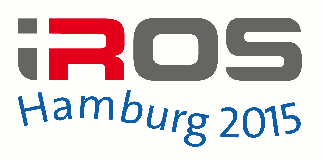
October 01, 2015
2015 IEEE/RSJ International Conference on Intelligent Robots and Systems (IROS’15)
Organizers:
Raj Madhavan, IEEE RAS VP, Industrial Activities Board, Erwin Prassler, runfun Inc., Germany and Oliver Brock, Technische Universität Berlin, Germany.
In the last few years, entrepreneurship in robotics and automation has received renewed interest due to several high profile acquisitions (e.g. Amazon's $775 million acquisition of Kiva Systems in early 2012 and Google's acquisition of eight robotics companies in late 2013) among other success stories (e.g. DJI valued at $8 billion as of May 2015). To foster the entrepreneurial spirit and to provide a platform to encourage researchers and practitioners to transition ideas and prototypes to commercializable products, the IEEE Robotics and Automation Society's Industrial Activities Board invited the robotics and automation community to participate in an Entrepreneurship Forum and Start-up Competition (EFSC) at the 2015 IEEE/RSJ International Conference on Intelligent Robots and Systems (IROS'15) in Hamburg. The event is intended to inspire, educate, enable, and empower researchers, students, young professionals, and anyone else who has the "start-up bug" in starting companies.
The EFSC Program Booklet can be downloaded here.
Finalist #1
Business Idea
Amputees don’t have feelings from their prosthesis. We provide SENSY, unique device enabling them to feel skin softness or a stone trampled during walking.
Biography
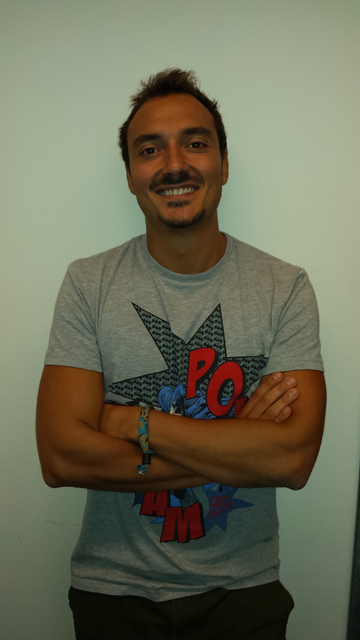
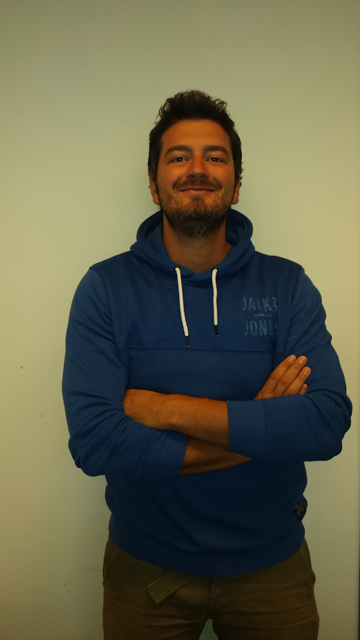 Francesco Maria Petrini since 5 years develops smart and innovative strategies to create the link between the human peripheral nervous system and technology. He has received his Bachelor and Master degrees in biomedical engineering cum laude at University of Tor Vergata (Rome, Italy) and his PhD in neuroprosthetics and neural interfaces at Campus Bio-Medico (Rome). During his studies, he has visited for more than two years the most important technological schools of Europe, École polytechnique fédérale de Lausanne (EPFL, Switzerland) and Imperial College of London, receiving certificates for business and management competencies. He has been for 2 years the manager of the SCRIPT European project for San Raffaele Pisana (Rome) and he has worked within several relevant European projects (TIME, EPIONE). He holds 1 patent application. Stanisa Raspopovic has over 8 years of experience in the neuroprosthetic field, especially in algorithm development, modelling, animal and clinical experimentation. He was in charge of several relevant EU projects (Cyberhand, TIME, EPIONE, NEBIAS), as in Swiss and Italian collaborations. Dr. Raspopovic graduated at University of Pisa (Italy) with honours in Electrical and Biomedical Engineering (MSc) and got the PhD at Scuola Superiore Sant’Anna (SSSA, Italy) in Neuroengineering and Robotics. He was scientist at Eidgenössische Technische Hochschule (ETH, Switzerland) and École polytechnique fédérale de Lausanne (EPFL, Switzerland), and visiting at Universitat Autònoma de Barcelona (UAB, Spain). He holds 2 patent applications. SensArs Neuroprosthetics, a LLC founded and registered in Switzerland (Vaud) in June 2014 by Francesco Petrini, Stanisa Raspopovic, two researchers of the École polytechnique fédérale de Lausanne (EPFL), and Silvestro Micera, professor at EPFL and Scuola Superiore Sant’Anna of Pisa (SSSA). The company comes from the group of research of prof. Micera which has worked for more than 10 years in the field of peripheral nerve interfaces. Our mission is to restore motor and sensory functionalities of amputees and nerve-damaged people.
Francesco Maria Petrini since 5 years develops smart and innovative strategies to create the link between the human peripheral nervous system and technology. He has received his Bachelor and Master degrees in biomedical engineering cum laude at University of Tor Vergata (Rome, Italy) and his PhD in neuroprosthetics and neural interfaces at Campus Bio-Medico (Rome). During his studies, he has visited for more than two years the most important technological schools of Europe, École polytechnique fédérale de Lausanne (EPFL, Switzerland) and Imperial College of London, receiving certificates for business and management competencies. He has been for 2 years the manager of the SCRIPT European project for San Raffaele Pisana (Rome) and he has worked within several relevant European projects (TIME, EPIONE). He holds 1 patent application. Stanisa Raspopovic has over 8 years of experience in the neuroprosthetic field, especially in algorithm development, modelling, animal and clinical experimentation. He was in charge of several relevant EU projects (Cyberhand, TIME, EPIONE, NEBIAS), as in Swiss and Italian collaborations. Dr. Raspopovic graduated at University of Pisa (Italy) with honours in Electrical and Biomedical Engineering (MSc) and got the PhD at Scuola Superiore Sant’Anna (SSSA, Italy) in Neuroengineering and Robotics. He was scientist at Eidgenössische Technische Hochschule (ETH, Switzerland) and École polytechnique fédérale de Lausanne (EPFL, Switzerland), and visiting at Universitat Autònoma de Barcelona (UAB, Spain). He holds 2 patent applications. SensArs Neuroprosthetics, a LLC founded and registered in Switzerland (Vaud) in June 2014 by Francesco Petrini, Stanisa Raspopovic, two researchers of the École polytechnique fédérale de Lausanne (EPFL), and Silvestro Micera, professor at EPFL and Scuola Superiore Sant’Anna of Pisa (SSSA). The company comes from the group of research of prof. Micera which has worked for more than 10 years in the field of peripheral nerve interfaces. Our mission is to restore motor and sensory functionalities of amputees and nerve-damaged people.
Finalist #2
Business Idea
Macrobotix' Skyline Printer paints buildings without the need for people to leave the ground, avoiding safety risks and the need for costly & time consuming scaffolding.
Biography
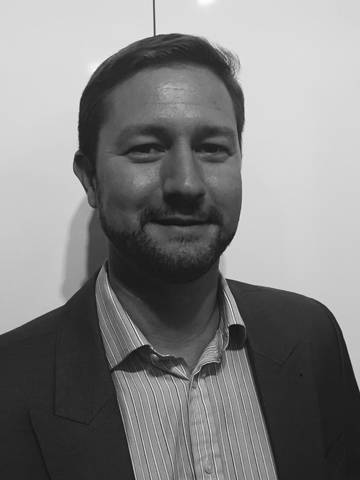 Ivan Storr is an experienced ICT Project Manager with a background in Computer Science, Telecoms, Engineering and experience in climbing, rigging & working at heights, robotics & prototyping, and commercial painting.
Ivan Storr is an experienced ICT Project Manager with a background in Computer Science, Telecoms, Engineering and experience in climbing, rigging & working at heights, robotics & prototyping, and commercial painting.
Finalist #3
Business Idea
Therabot™ is a lifelike therapeutic robotic dog, that provides autonomous support during counseling and home therapy for post‐traumatic stress disorder (PTSD) victims.
Biography
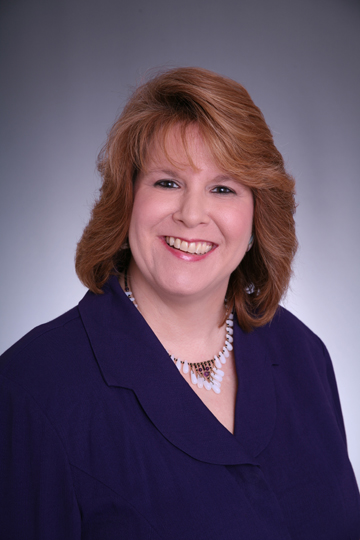 Cindy L. Bethel, Ph.D. (IEEE and ACM Senior Member) is an Associate Professor in the Computer Science and Engineering Department at Mississippi State University (MSU). She is the Director of the Social, Therapeutic, and Robotic Systems (STaRS) lab and an affiliated faculty member with the Department of Psychology. In March 2015, she was inducted as a member of the Academy of Distinguished Teachers in the Bagley College of Engineering at MSU. She also was awarded the 2014- 2015 ASEE New Faculty Research Award for Teaching. She was a NSF/CRA/CCC Computing Innovation Postdoctoral Fellow in the Social Robotics Laboratory at Yale University. In 2008, She was a National Science Foundation Graduate Research Fellow and the recipient of the 2008 IEEE Robotics and Automation Society Graduate Fellowship. She graduated in August 2009 with her Ph.D. in Computer Science and Engineering from the University of South Florida. Her research interests are in human-robot interaction, robotics, and artificial intelligence. Her research focuses on applications associated with robotic therapeutic support, information gathering from children, and the use of robots for law enforcement, search and rescue, and military. A company is currently under formation. The first prototype was developed and presented in March 2015 at the 10th ACM/IEEE International Conference on Human-Robot Interaction and was a finalist receiving second place out of 10 demonstrations. Therabot has received international press and attention including an article in Wired Magazine.
Cindy L. Bethel, Ph.D. (IEEE and ACM Senior Member) is an Associate Professor in the Computer Science and Engineering Department at Mississippi State University (MSU). She is the Director of the Social, Therapeutic, and Robotic Systems (STaRS) lab and an affiliated faculty member with the Department of Psychology. In March 2015, she was inducted as a member of the Academy of Distinguished Teachers in the Bagley College of Engineering at MSU. She also was awarded the 2014- 2015 ASEE New Faculty Research Award for Teaching. She was a NSF/CRA/CCC Computing Innovation Postdoctoral Fellow in the Social Robotics Laboratory at Yale University. In 2008, She was a National Science Foundation Graduate Research Fellow and the recipient of the 2008 IEEE Robotics and Automation Society Graduate Fellowship. She graduated in August 2009 with her Ph.D. in Computer Science and Engineering from the University of South Florida. Her research interests are in human-robot interaction, robotics, and artificial intelligence. Her research focuses on applications associated with robotic therapeutic support, information gathering from children, and the use of robots for law enforcement, search and rescue, and military. A company is currently under formation. The first prototype was developed and presented in March 2015 at the 10th ACM/IEEE International Conference on Human-Robot Interaction and was a finalist receiving second place out of 10 demonstrations. Therabot has received international press and attention including an article in Wired Magazine.
Finalist #4
Business Idea
We help students learn basic engineering concepts in a better, faster and smarter way by providing an interactive learning tool on a robotic platform called eBot.
Biography
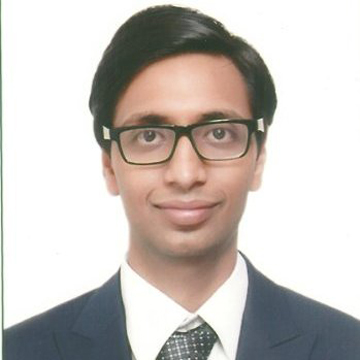 Abhishek Gupta is a founder of Robotic educational Company EdgeBotix. Edgebotix developed a versatile robotics platform to better teach students concepts in computer science, robotics and mechatronics. eBot can be controlled from any platform windows, linux , Mac, Android, iOS through wireless communication. Any software programming language can be used to program eBot and could help students learn software like MATLAB, Android programing, IOS programming. He previously worked as a Research Engineer at the Motion, Energy and control lab. He has a Bachelor Degree in Electronics, and a Master degree in Embedded System from the Nanyang Technological University NTU.
Abhishek Gupta is a founder of Robotic educational Company EdgeBotix. Edgebotix developed a versatile robotics platform to better teach students concepts in computer science, robotics and mechatronics. eBot can be controlled from any platform windows, linux , Mac, Android, iOS through wireless communication. Any software programming language can be used to program eBot and could help students learn software like MATLAB, Android programing, IOS programming. He previously worked as a Research Engineer at the Motion, Energy and control lab. He has a Bachelor Degree in Electronics, and a Master degree in Embedded System from the Nanyang Technological University NTU.
Finalist #5
Business Idea
MeeYoo, Care for Me, Care for you. Transform your phone into a symbiotic creature who helps you to achieve a better lifestyle.
Biography
 Stephane Lallee is a software engineer, a PhD in neuro-robotics and a young entrepreneur. He spent the last 7 years creating human robot interactive systems through regular software engineering and neural network approaches. His main goal is to bring feeling-worthy robots to people, not machines but artificial friends. He recently started his venture to reach this goal through a unique concept, MeeYoo.
Stephane Lallee is a software engineer, a PhD in neuro-robotics and a young entrepreneur. He spent the last 7 years creating human robot interactive systems through regular software engineering and neural network approaches. His main goal is to bring feeling-worthy robots to people, not machines but artificial friends. He recently started his venture to reach this goal through a unique concept, MeeYoo.
Finalist #6
Business Idea
Rochepibox (robotic-chef‐pizza-box) a fast and efficient chain of robotized pizza restaurants where robotic arms make your pizza.
Biography
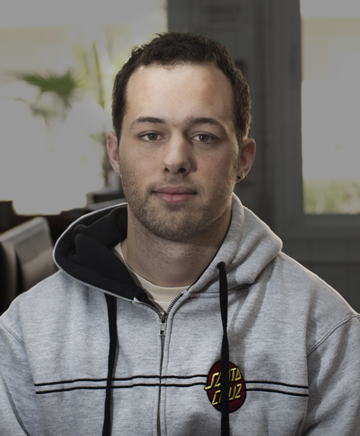 Marco A. Gutiérrez is a PhD student in cognitive vision for robotics systems at the Robotics and Artificial Vision Laboratory (RoboLab) from the University of Extremadura, Spain since 2011. He is currently holding an A*STAR Research Attachment Programme (ARAP) scholarship in the Human Language Technology Department at I2R, A*STAR, Singapore. He obtained the highest evaluation possible (above expectations on all fields) on his internship at KUKA Laboratories GmbH, Augsburg, Germany in 2012. Recently his team (Ursus) was awarded with Best Team for Functionality Benchmark on Object Perception and Speech Understanding at the Rocking Robot Challenge 2014 in Tolouse, France. He has contributed to several open-source robotics and computer vision related projects like RoboComp and the Point Cloud Library as organization administrator and mentor (respectively) for several editions of the Google Summer of Code programme (2013, 2014 and 2015). His recent areas of research include cognitive vision, deep neural networks, multimodal systems and word semantics. He is organizer of the Workshop on Multimodal Semantics for Robotics Systems and Advisory Committee for The Path to Success: Failures in Real Robots Workshop as part the IROS 2015 conference.
Marco A. Gutiérrez is a PhD student in cognitive vision for robotics systems at the Robotics and Artificial Vision Laboratory (RoboLab) from the University of Extremadura, Spain since 2011. He is currently holding an A*STAR Research Attachment Programme (ARAP) scholarship in the Human Language Technology Department at I2R, A*STAR, Singapore. He obtained the highest evaluation possible (above expectations on all fields) on his internship at KUKA Laboratories GmbH, Augsburg, Germany in 2012. Recently his team (Ursus) was awarded with Best Team for Functionality Benchmark on Object Perception and Speech Understanding at the Rocking Robot Challenge 2014 in Tolouse, France. He has contributed to several open-source robotics and computer vision related projects like RoboComp and the Point Cloud Library as organization administrator and mentor (respectively) for several editions of the Google Summer of Code programme (2013, 2014 and 2015). His recent areas of research include cognitive vision, deep neural networks, multimodal systems and word semantics. He is organizer of the Workshop on Multimodal Semantics for Robotics Systems and Advisory Committee for The Path to Success: Failures in Real Robots Workshop as part the IROS 2015 conference.
Finalist #7
Business Idea
A hardware/software solution to extend 3D laser scanning to high-precision 3D in-motion-scanning.
Biography
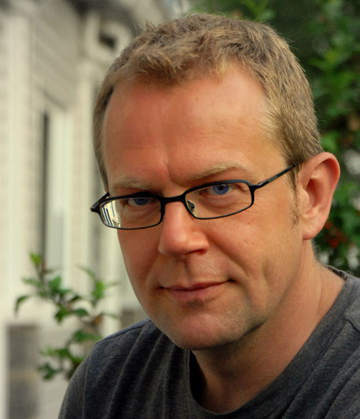 Rolf Lakaemper’s founding career started early: in 1985, he founded Germany’s first computer game company, ‘Magic Bytes’. After studying Applied Mathematics at the University of Hamburg (PhD 2000), he co-founded the Voice over IP company, Nikotel. In 2003, Dr. Lakaemper joined Temple University, Philadelphia, USA, where he currently works as an Associate Professor involved in research on computer vision and robotics. As co-founder of Measurement in Motion (MiM), he augments the team of Dr. Elseberg and Dr. Janotta to offer solutions related to high precision 3D laser scanning. As a spin-off from University research, MiM was founded in 2015, supported by European and German funding programs. The company offers high end, industry level 3D laser scanning solutions with the core advantage of acquiring precise 3D data in motion. With primary customers in industries like the automotive industry, MiM products strive to promote the introduction of modern techniques like virtual/augmented reality based production support.
Rolf Lakaemper’s founding career started early: in 1985, he founded Germany’s first computer game company, ‘Magic Bytes’. After studying Applied Mathematics at the University of Hamburg (PhD 2000), he co-founded the Voice over IP company, Nikotel. In 2003, Dr. Lakaemper joined Temple University, Philadelphia, USA, where he currently works as an Associate Professor involved in research on computer vision and robotics. As co-founder of Measurement in Motion (MiM), he augments the team of Dr. Elseberg and Dr. Janotta to offer solutions related to high precision 3D laser scanning. As a spin-off from University research, MiM was founded in 2015, supported by European and German funding programs. The company offers high end, industry level 3D laser scanning solutions with the core advantage of acquiring precise 3D data in motion. With primary customers in industries like the automotive industry, MiM products strive to promote the introduction of modern techniques like virtual/augmented reality based production support.
Finalist #8
Business Idea
Based on revolutionary design and a powerful interactive intelligence platform, Furhat Robotics is a research spin-off startup that builds the world's most social robot.
Biography
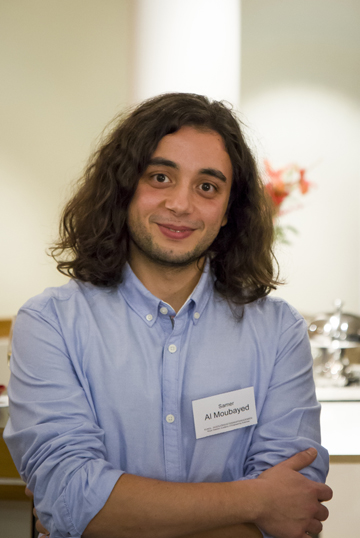 Samer Al Moubayed received his PhD in Computer Science in 2012 in the area of multimodal speech interaction from KTH The Royal Institute of Technology, Stockholm, Sweden. After that, he joined Disney Research Labs where he did research in the area of human-child language-based interaction, and human-robot interaction control and conversational systems. His research interests include embodied dialogue systems, computational models of turn taking, multimodal facial synthesis, and social signal processing. He is the recipient of the 2013 Christian Benoit award for his work on face-to-face communication. His work has been exhibited at several international venues and featured, among others, on BBC, New Scientist and the Swedish Radio and Television. His work has also resulted in the Outstanding Demo Award at ICMI 2012 and the Robotdalen International Innovation Award in 2013. In 2014, Samer co-founded Furhat Robotics, a KTH spin-off startup that's mission is to make social robots a reality. Furhat Robotics is based on an award-winning robot head design, and a powerful social intelligence platform that integrates interactive technology in speech, vision and language understanding to build human-like fluent and effective conversations with humans in real-world environments. Furhat Robotics has received numerous coverage in the media and several awards including Sweden's startup of the year in 2015.
Samer Al Moubayed received his PhD in Computer Science in 2012 in the area of multimodal speech interaction from KTH The Royal Institute of Technology, Stockholm, Sweden. After that, he joined Disney Research Labs where he did research in the area of human-child language-based interaction, and human-robot interaction control and conversational systems. His research interests include embodied dialogue systems, computational models of turn taking, multimodal facial synthesis, and social signal processing. He is the recipient of the 2013 Christian Benoit award for his work on face-to-face communication. His work has been exhibited at several international venues and featured, among others, on BBC, New Scientist and the Swedish Radio and Television. His work has also resulted in the Outstanding Demo Award at ICMI 2012 and the Robotdalen International Innovation Award in 2013. In 2014, Samer co-founded Furhat Robotics, a KTH spin-off startup that's mission is to make social robots a reality. Furhat Robotics is based on an award-winning robot head design, and a powerful social intelligence platform that integrates interactive technology in speech, vision and language understanding to build human-like fluent and effective conversations with humans in real-world environments. Furhat Robotics has received numerous coverage in the media and several awards including Sweden's startup of the year in 2015.
Finalist #9
Business Idea
We enable robotics companies to rapidly add dexterous manipulation, motion planning, and other software capabilities to their robots through easy human interfaces.
Biography
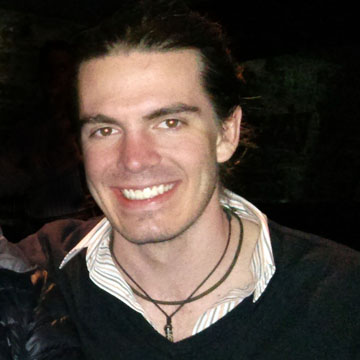 Dave Coleman, B.S. MechE Georgia Tech, M.S. CompSci CU Boulder, has 10 years of experience working in the field of robotics automation, including the pre-existing motion planning software MoveIt! along with the rest of the Robot Operating System. Dave has been a leader in the open source community and will finish his PhD on robotic motion planning later this year. Working at many robotics companies, Dave’s insights into the needs of a robot-agnostic platform that works for different morphologies, different theoretical approaches, and different end-user technical needs have given him a well rounded understanding of the needs of robotic software. Using this knowledge, Dave believes PickNik will bring to market a well supported platform that enables the next generation of robotics capabilities.
Dave Coleman, B.S. MechE Georgia Tech, M.S. CompSci CU Boulder, has 10 years of experience working in the field of robotics automation, including the pre-existing motion planning software MoveIt! along with the rest of the Robot Operating System. Dave has been a leader in the open source community and will finish his PhD on robotic motion planning later this year. Working at many robotics companies, Dave’s insights into the needs of a robot-agnostic platform that works for different morphologies, different theoretical approaches, and different end-user technical needs have given him a well rounded understanding of the needs of robotic software. Using this knowledge, Dave believes PickNik will bring to market a well supported platform that enables the next generation of robotics capabilities.
Finalist #10
Business Idea
Tacterion provides a stretchable artificial skin for robots and beyond – Enabling safe and intuitive HMI as well as dexterous manipulation of unknown or delicate objects.
Biography
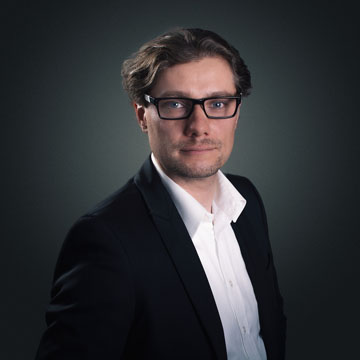 Michael Strohmayr received his Diploma from University of Applied Sciences Augsburg (HSA) in 2005 and his M.Sc. in Biomedical Engineering in 2007 from TU Munich (TUM). Since 2007 he worked at the DLR (German Aerospace Center) - Institute of Robotics and Mechatronics and received his PhD from Karlsruhe Institute of Technology (KIT) in 2012. His research at DLR towards a multifunctional artificial skin for robotic systems formed the basis for the foundation of tacterion. Currently supported by Helmholtz Enterprise Fonds – tacterion will bring the artificial skin technology to market. The unique combination of high sensitivity and collision-tolerant design of the stretchable skin enables the acquisition of tactile information on 3D-curved and even deformable surfaces. Thus, future applications of tacterion’s artificial skin range from intelligent grippers for automation to full body covers for humanoids and robotic hands and prostheses for dexterous manipulation.
Michael Strohmayr received his Diploma from University of Applied Sciences Augsburg (HSA) in 2005 and his M.Sc. in Biomedical Engineering in 2007 from TU Munich (TUM). Since 2007 he worked at the DLR (German Aerospace Center) - Institute of Robotics and Mechatronics and received his PhD from Karlsruhe Institute of Technology (KIT) in 2012. His research at DLR towards a multifunctional artificial skin for robotic systems formed the basis for the foundation of tacterion. Currently supported by Helmholtz Enterprise Fonds – tacterion will bring the artificial skin technology to market. The unique combination of high sensitivity and collision-tolerant design of the stretchable skin enables the acquisition of tactile information on 3D-curved and even deformable surfaces. Thus, future applications of tacterion’s artificial skin range from intelligent grippers for automation to full body covers for humanoids and robotic hands and prostheses for dexterous manipulation.
Finalist #11
Business Idea
Social problem solving by dramatically enhancing QoL of people with lower body paralysis or elderly people through the use of passive exoskeletons with smart mechatronics in personal mobility.
Biography
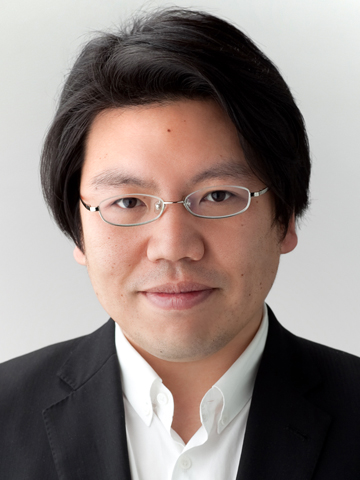 Kenji Suzuki received the Ph.D. degrees in Pure and Applied Physics from Waseda University, Tokyo, Japan, in 2003. He is currently an Associate Professor at the Center for Cybernics Research, and Principal Investigator of Artificial Intelligence Laboratory, University of Tsukuba, Japan. He was a visiting researcher at the Laboratory of Musical Information, University of Genoa, Italy, and the Laboratory of Physiology of Perception and Action, Collége de France, France. His recent works include assistive and rehabilitation robotics, cognitive robotics, affective computing, biosignal processing, wearable devices and social imaging. He is leading several projects of medical robots/devices for stroke, spinal cord injury, and dysphagia, and also wearable devices for children with autism spectrum disorders (ASD). He is also principal and co-founder of PLIMES Company, Ltd., Japan, which is a university-based prelaunch startup, working on human assistive technologies for physically and cognitively challenged in all the different age categories. They are extending solutions in the B2B space as well as to the individual customers directly.
Kenji Suzuki received the Ph.D. degrees in Pure and Applied Physics from Waseda University, Tokyo, Japan, in 2003. He is currently an Associate Professor at the Center for Cybernics Research, and Principal Investigator of Artificial Intelligence Laboratory, University of Tsukuba, Japan. He was a visiting researcher at the Laboratory of Musical Information, University of Genoa, Italy, and the Laboratory of Physiology of Perception and Action, Collége de France, France. His recent works include assistive and rehabilitation robotics, cognitive robotics, affective computing, biosignal processing, wearable devices and social imaging. He is leading several projects of medical robots/devices for stroke, spinal cord injury, and dysphagia, and also wearable devices for children with autism spectrum disorders (ASD). He is also principal and co-founder of PLIMES Company, Ltd., Japan, which is a university-based prelaunch startup, working on human assistive technologies for physically and cognitively challenged in all the different age categories. They are extending solutions in the B2B space as well as to the individual customers directly.
Finalist #12
Business Idea
Portable, image-guided medical robot that improves the accuracy, safety, and cost-effectiveness of venipuncture by drawing blood and performing intravenous procedures in an automated fashion.
Biography
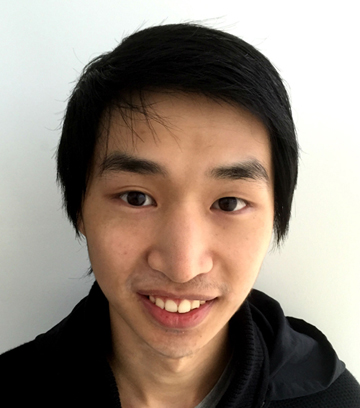 Alvin Chen is a co-founder and the lead engineer of VascuLogic, where he has helped to develop the first three prototypes of the VenousPro(TM) automated venipuncture device. In addition to working at VascuLogic, Mr. Chen is also a National Institutes of Health Graduate Research Fellow at Rutgers University, where he will receive his Ph.D. degree in Biomedical Engineering. Mr. Chen’s background is in computer vision, machine learning, and medical robotics. VascuLogic, LLC is an early stage medical device company based in New Jersey, U.S.A. Its mission is to develop and commercialize image-guided medical technologies that significantly improve the accuracy and safety of venous access.
Alvin Chen is a co-founder and the lead engineer of VascuLogic, where he has helped to develop the first three prototypes of the VenousPro(TM) automated venipuncture device. In addition to working at VascuLogic, Mr. Chen is also a National Institutes of Health Graduate Research Fellow at Rutgers University, where he will receive his Ph.D. degree in Biomedical Engineering. Mr. Chen’s background is in computer vision, machine learning, and medical robotics. VascuLogic, LLC is an early stage medical device company based in New Jersey, U.S.A. Its mission is to develop and commercialize image-guided medical technologies that significantly improve the accuracy and safety of venous access.
